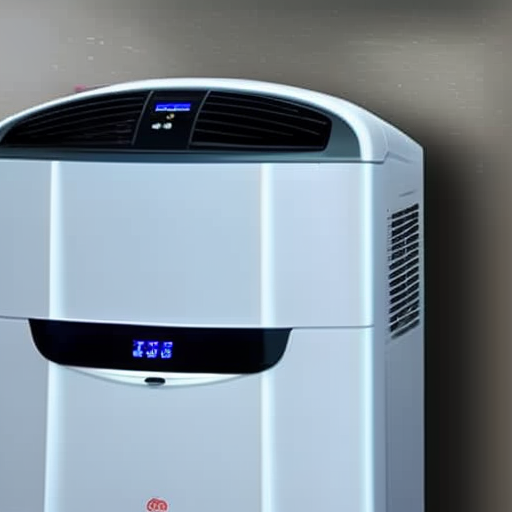Humidity levels can make or break your indoor living experience. Too much and you’ll feel lost in a sea of perspiration, while too little leaves you feeling like a raisin in the sun. Enter the dehumidifier, the superhero of home appliances that may just be the answer to all of our humidity problems. But is it okay to stay in a room with a dehumidifier? Let’s settle this once and for all.
The Effect of Dehumidifiers on Room Conditions
Have you ever walked into a room with a dehumidifier and felt like the air was a bit stale or dry? Maybe you’ve seen the water tank fill up quickly or noticed a decrease in musty odors. While dehumidifiers are designed to reduce excess moisture in the air, they can also have an impact on other room conditions.
- Firstly, dehumidifiers can help alleviate allergy and asthma symptoms by reducing the amount of mold, dust mites, and other allergens present in the air. By removing excess moisture, these irritants have less opportunity to thrive and spread throughout the room.
- In addition to improving air quality, dehumidifiers can also reduce the chances of structural damage caused by excess moisture. This can help prevent issues like mold growth, warped furniture, and peeling wallpaper.
The Pros and Cons of Having a Dehumidifier in Your Room
Having a dehumidifier in your room can have its benefits and drawbacks. Let’s discuss the pros and cons so you can decide if it’s the right choice for you.
Pros:
– Reduces moisture: A dehumidifier helps to decrease the humidity in the air, which can prevent mold, dampness, and musty odors.
– Relieves allergies: If you suffer from allergies or asthma, a dehumidifier can alleviate symptoms by reducing the amount of dust mites and mold spores in the air.
– Protects furniture: High humidity can cause wood and leather furniture to warp, mold, or crack. By using a dehumidifier, you can extend the lifespan of your expensive items.
Cons:
– Noise: Dehumidifiers can be loud, especially if you’re using it in a smaller space. Consider getting a quieter model or finding a way to muffle the sound.
– Maintenance: Dehumidifiers require regular cleaning and filter replacement to function effectively. Failure to do so can lead to bacteria growth or water leaks.
– Cost: Purchasing a dehumidifier can be expensive, but it can also save you money in the long run by preventing damage to your home and belongings.
Overall, having a dehumidifier in your room can be beneficial for your health and home, but it’s important to weigh the pros and cons before making a decision.
The Potential Health Risks of Using a Dehumidifier in an Enclosed Space
Dehumidifiers are a lifesaver during hot and humid weather or when trying to tackle mold growth. But, did you know that using a dehumidifier in an enclosed space, like a room, can pose potential health risks? Let’s explore some of those risks so you can make an informed decision about whether to use a dehumidifier in your home.
First on the list is the risk of breathing difficulties. That’s because dehumidifiers work by pulling moisture out of the air and that can lead to a reduction in humidity levels. When the level of humidity falls below a certain point, it can cause respiratory issues like dry throat, nosebleeds, and difficulty breathing. So, if you’re using a dehumidifier in a small room without proper ventilation for an extended period, it can go from being helpful to potentially harmful. It’s essential to make sure the air is adequately humidified to avoid any adverse breathing effects.
Second, there’s the risk of over-drying the air. It’s the opposite of the first issue, but equally concerning. Over-drying the air can lead to dry skin, chapped lips, and other skin problems. Also, it can lead to the drying of the mucous membrane in the nose, making it vulnerable to infections. This risk is more pronounced in colder months since the air is naturally drier. If you do decide to use a dehumidifier in an enclosed space, keeping the humidity level between 30 and 50% can help you avoid this risk. Overall, using a dehumidifier is a great way to control the humidity in your home, but it’s essential to be mindful of the potential risks involved.
Tips for Safely Operating a Dehumidifier in Your Bedroom
One of the most important things to remember when using a dehumidifier in your bedroom is to make sure it is positioned correctly. It should be placed at least a couple of feet away from walls and furniture to allow for proper air flow. Additionally, it’s a good idea to keep it elevated off the floor by placing it on a table or stand to prevent any water damage.
Another tip for safely operating a dehumidifier in your bedroom is to not ignore the warning signs. If the water reservoir is full, the machine will automatically shut off, but it’s important to make sure to empty it regularly to avoid mold and bacteria buildup. It’s also recommended to clean the machine every few weeks to prevent any unwanted particles from entering the air in your bedroom. By following these simple tips, you can ensure a safe and comfortable environment while using a dehumidifier in your bedroom. In conclusion, deciding whether or not to use a dehumidifier in your bedroom ultimately depends on your personal preferences and specific circumstances. However, by weighing the potential benefits and drawbacks and following a few simple safety tips, it is possible to create a comfortable and healthy sleeping environment. So go ahead, dehumidify your dreams, and sleep tight!